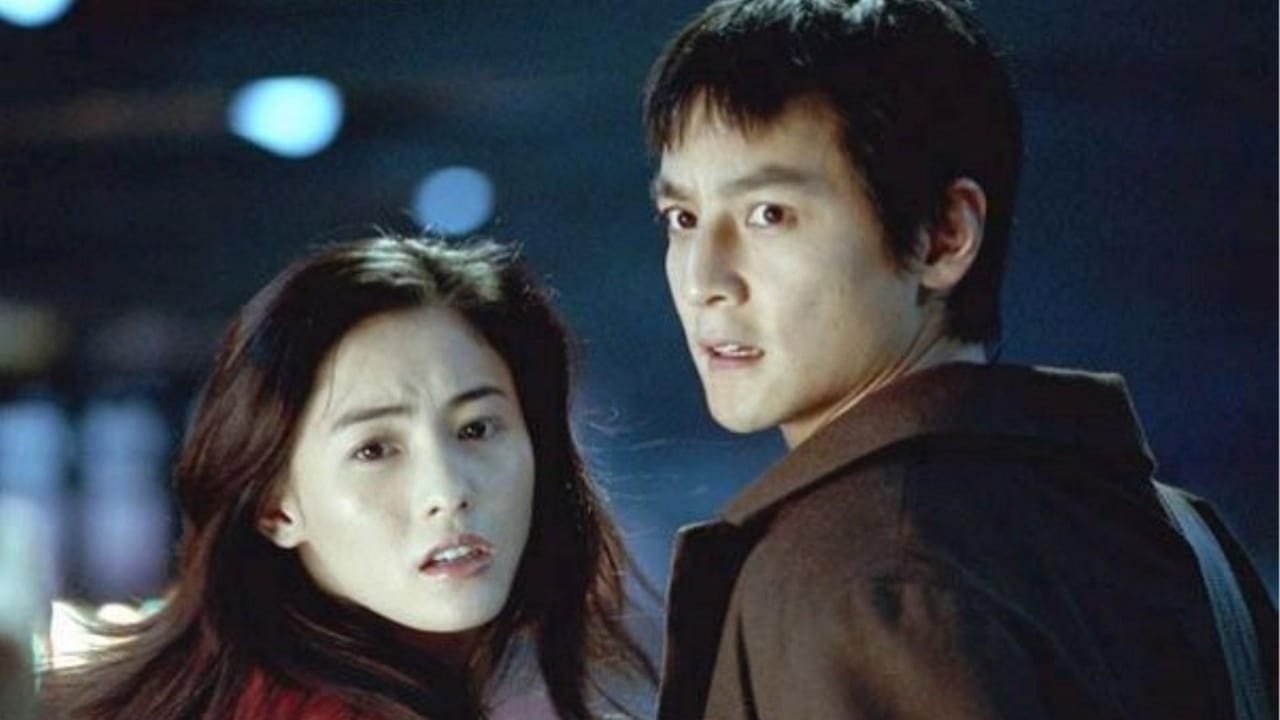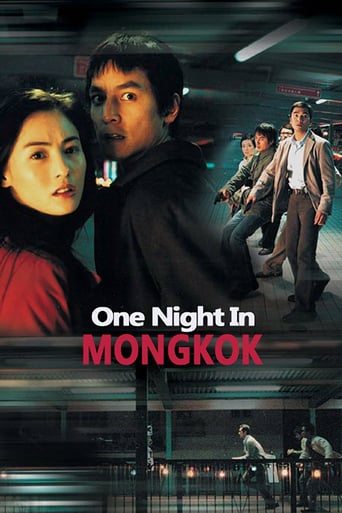SpuffyWeb
Sadly Over-hyped
BroadcastChic
Excellent, a Must See
Yash Wade
Close shines in drama with strong language, adult themes.
Sarita Rafferty
There are moments that feel comical, some horrific, and some downright inspiring but the tonal shifts hardly matter as the end results come to a film that's perfect for this time.
Leofwine_draca
ONE NITE IN MONGKOK, a Hong Kong cop thriller about an assassin about to carry out his first hit, sounds like the typical all-action thriller, but on watching it turns out to be something much darker, more subtle and mature in its developing themes. It's a highly effective cat and mouse thriller that prioritises character over action and is all the better for it.Daniel Wu is one of my all-time favourite Chinese stars and this is one of his top roles. His character, a would-be assassin starting out on his first job, sounds unsympathetic at first but he grows on you as the film develops, and as his growing relationship with Cecilia Cheung is handled sympathetically and with realistic emotion. By the end, you're rooting for him and his cause.The rest of the film is more familiar, but it all works and slots into place nicely. Alex Fong's bull-headed cop is a worthwhile adversary for our star, and the supporting cast of pimps and drug dealers, grasses and gangsters, is a well developed one. Although the film sometimes has shades of BOURNE it develops its own unique style as it progresses, gradually building to an ultimately devastating climax which took my breath away. It's an astonishing way to end a film, and one which has stayed with me days later.
benjamin_lappin
Set over the course of three days and two nights, One Night In Mongkok sifts through several stories weaving together the joint themes of fate and sin coupled together with the violence that is inevitably associated with the genre. While being heavily praised, and winning various awards at the ever increasingly dubious Hong Kong Film Awards, One Night In Mongkok is a pretty timid affair, which sacrifices continuity, gripping characters and more over a worthy plot for pretty cinematography and an over inflated sense of self important philosophy.Throughout the duration of its two hour course, Mongkok shows promise sporadically as it never maintains the gritty integrity that it does eventually manage to capture in varying moments. The distaste for the film derives from an extremely languishing start which crescendos into a severely incoherent plot that will make the most ardent Tartan Asia Extreme fan scratch their heads in bewilderment. That's not to say the plot is incomprehensible, merely that it jumps around from scene to scene veering off at random tangents away from established story lines to eventually, and only just, making 'a' point of sorts, but never arriving at the destination from which it set off from in the first place. The director does show that he has a penchant for framing a shot, and indeed highlights his ability to create stirring and gripping moments which do provide something fresh to the crime thriller genre. However, fifteen minutes of footage is not sufficient enough to compensate for a severely Luke warm story which sets itself out as a different prospect from its contemporaries, but comes across as severely generic.That which is most infuriating about the film, is the fore-mentioned sense of self importance. While ostensibly a crime drama, Mongkok quickly descends into a morality tale of quite obvious proportions, and chooses to opt for brashness instead of subtlety when it comes to sledgehammering its point across. What point you ask? Again, the point is fairly well devised to an extent, but is extraordinarily generic, as it claims that 'good guys' are not always righteous as they appear, and that nor are the 'bad guys' as unemotional as they may be perceived to be. It also throws around a sense of karmic justice as the "it's fate would have it....and so would sin" line resonates off key throughout the films latter stages, therefore providing a justification for the director to cram home the 'twists' and 'turns' (the apostrophe's denoting a sarcastic appraisal of the terms).The director, Tung-Shung Yee comments on the social failings of the police force in Hong Kong, which culminates in a wonderfully constructed scene involving a bungled arrest turned cover-up by the police. Unfortunately his spoken text, the passing down of 'wisdom' from senior police officer to his junior proves to be a double edged sword, as it provides for the irony in the films closing moments. The problem with Mongkok is that Yee wishes to have his cake and eat it. He cannot decide whether or not he should be praising the police, or condemning them, making the audience sympathise with Lai Fu and then be forced to feel little for him. It's indecisive cinema which aims high but punches well below its weight.The main problem with Mongkok lies in that it does try to be a successful piece of cinema, it tries to be a blistering affair, and to be fair it does succeeds, but to the annoyance of the viewer only momentarily. There are unnecessary moments throughout this film like the battering ram philosophical approach or the unnecessarily chrome start to the film when the cinematography throughout is crisp and well composed. Its chopping and changing story is severely unrefined, and while the story itself can be perfectly understood it provides for rather static viewing when the story need be flowing. One Night In Mongkok sets its aims high, and that cannot be taken for granted, for rather a failed film with noble intentions than a profitable success which will forgo the integrity. But what really grates is the incessant comparison by Film Review, lower brow newspapers and certain IMDb reviewers with the simply brilliant Infernal Affairs. Having been swayed initially by the extract on the front which compared Mongkok to Infernal, I find myself not disgusted just severely disappointed with the effort. I steadied myself for a rip-roaring epic, a film worthy to be mentioned in the same breath as Infernal, and I got an Infernal Affair for all the wrong reasons. To be frank there are much grander films in the Tartan Asia collection which supercede this effort, A Bittersweet Life springs instantly to mind, and while the film may appeal to some it lacks the longevity to truly compete with which it sets out to emulate. By all means have a look but you'll be checking out once you realise that one night truly is too long a stay in Mongkok.
wongsaur
While long-time Hong Kong residents dismiss Dan Dan & Lai Fu as mainland country bumpkins, Dan Dan portrays herself as being a tough & sophisticated pro to Lai Fu. She mocks Lai Fu's sweetheart as a prostitute and at the restaurant she also brags about her own earning power where she claims she has already made $8,000 in 3 weeks. Of course all the while she is showing what a gold digger she is too. However after the purse snatching incident when Lai Fu says that he will pay Dan Dan for her trouble and time as his guide in Mongkok, she asks for $3,500 and is promptly paid. Dan Dan later suffers cramps during that fateful night and asks Lai Fu to buy Panadol at the drugstore and to get some smaller bills in her purse, Lai Fu goes to get the money and sees that she doesn't have a huge wad of $8,000, only the small bills and what money he had previously paid her. At the end of the movie when she departs HK territory, she looks in her purse and realizes that Lai Fu had given her all the money that he had. It basically raises the possibility that Dan Dan had never even turned a trick while in Mongkok, that she was exaggerating her own past history, or that at the very least she may have prostituted herself but never made any substantive profit to take home to her village.
Harry T. Yung
One Night in Mongkok stands out in one particular aspect: it's treatment of the subject of shooting to kill, particularly by the police.Granted, you see many things in this movie. There is the 'West Side Story' style opening of small skirmishes escalating into big brawls. There is the 'Godfather' style development of gangster warfare. There is the familiar-looking pair of fugitive from both the police and the underworld: hit man with cool head and prostitute with good heart. Betrayals, violence and generous supply of blood. Yes, we have all that. However, the most important element in the movie, at least the way I see it, is a subtext that is perhaps more than a subtext – what shooting and killing someone do to a policeman. While the act of putting a bullet through someone thereby ending his life is made commonplace in some movies and glorified in others, it is treated with earnest seriousness in ONIM. Instrumental to this treatment are two policemen: old hand and leader played by Alex Fong Chung-sun and bright young protégé. Although a seasoned veteran, the officer played by Fong is forever shadowed by an experience of shooting someone dead in the course of work. The young officer, on the other hand, although still relative green to the force, had already had a similar experience, but polarized reactions – he is proud of killing. The most memorable scene in the entire movie is when a group of policemen, led by Fong, breaks into a room occupied by a suspect. Once the door is open, trigger-happy young officer fires at the suspect, killing him instantly. This is a scene that provided Fong with the opportunity to put up his 4-star performance.While the other police officers are furious and petrified at this reckless folly, Fong is cool as ice although he must be filled with disgust. Calmly and resolutely, he orders everyone away to guard the entrances, giving them clear instructions to say to anybody asking that they are not present at the shooting. Then he tells his second-in-command to go to look for something 'useful'. With no luck such as finding guns on the victim, they at least find a kitchen knife, which they place in the victim's hand. THEN, he finally turns to the young officer and in icy coldness, instructs him to say that as soon as the door opened, the victim rushes out and attacked the policemen with the knife. They get away with this one because by a stroke of luck, they turn up hidden in the room drugs that worth a huge fortune. So a bungled up blunder turns into a big hit while the shooting is easily forgotten. There is disgust written all over Fong's face when he is surrounded by flattering congratulations. The young officer is easily forgiven by his comrades although it remains to be seen if he emerges as a sadder and wiser man. This, however, we never see. The biggest irony is that in the next confrontation just a few hours later, the young officer's momentary hesitation (undoubtedly because of the effect of the earlier shooting on him) costs him his life.

